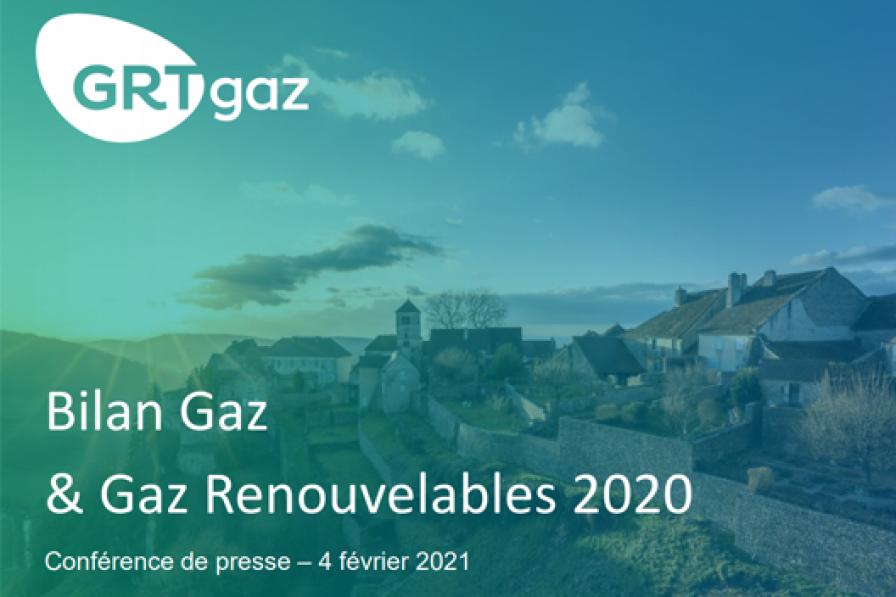2020 gas and renewable gas review

Gas consumption in France fell by 7% in 2020 compared to 2019. This reduction was down to the exceptionally mild weather, with 2020 being the warmest year on record in France since 1900. Aside from those industries more affected by Covid-19, the health situation ultimately had less of an impact than the climate on overall changes in French consumption for 2020.
France: Europe’s most competitive marketplace in 2020
The French marketplace, PEG1 France, became the most competitive in Europe in 2020, with an average price of €9.24/MWh over the past year (i.e. €0.11/MWh less than the TTF, the benchmark price in Europe). Given the abundance of LNG for much of the year, this competitiveness of the French wholesale market is the result of investments made in the gas infrastructure and market mechanisms to provide French consumers with a single gas marketplace as of 1 November 2018.
Combined gas cycle power plants: significant deployment to support the electricity system
Despite a fall in electricity consumption over the year (-5%), combined gas cycle (CCG) power plants were nevertheless called upon at a sustained level (44 TWh) in 2020. CCGs are flexible and can be swiftly mobilised. In 2020, they once again showed the key role they play in balancing the French electricity system, particularly during consumption peaks or to deal with uncertainties in other means of production.
Renewable gas: a breakthrough for anaerobic digestion and the emergence of the hydrogen sectors
Anaerobic digestion confirmed its strong development, with 214 sites injecting into the gas networks as of 31 December 2020 (+74% compared to 2019) for a total production capacity of 3.9 TWh (+75%), and 1,164 projects included in the capacity register. Twenty-one of the connected sites within the GRTgaz perimeter are operational.
Over the past year, gas network operators have made significant efforts to produce network diagrams, providing project owners with increased visibility. This inter-operator work has resulted in the approval of 190 zones by the Energy Regulatory Commission to date, with 100 additional zones under consideration. At the same time, three initial “reverse” sites in Noyal-Pontivy (Morbihan), Pouzauges (Vendée) and Mareuil-les-Meaux (Seine-et-Marne) are now operational on the GRTgaz network. These make it possible to transfer local biomethane surpluses on the distribution networks to the transmission network, for transport to another territory and/or into storage.
The publication of the European and French plans reveal 2020 to be a particularly active year in terms of hydrogen for GRTgaz. The Jupiter 1000 Power to Gas demonstrator has been injecting hydrogen molecules into the transmission network since February 2020. At the end of last year, GRTgaz had received 30 connection requests for all types of projects for the injection of synthetic gas resulting in particular from pyro-gasification and/or hydrogen.
Finally, with a long-term eye on achieving a 100% hydrogen network, GRTgaz and ten other gas infrastructure managers presented their development vision for a European “hydrogen backbone”: a dedicated network of 3,300 km of hydrogen pipes in France by 2040.
In keeping with this vision, GRTgaz and network managers CREOS and Encevo have launched the mosaHYc project, which aims to create a hydrogen valley between Germany, Luxembourg and France by converting 70 km of gas pipes into a 100% hydrogen transmission infrastructure.
Significant investments by GRTgaz despite the situation linked to Covid-19
GRTgaz invested €386 million in 2020, maintaining a significant level of financial commitment to ensure the security of transmission, to maintain and modernise its facilities, and to step up its support for the energy transition. On this last point, the company invested €40 million last year (+29% compared to 2019) to develop renewable gas and reduced carbon uses.
1 PEG (Point d’Échange de Gaz ): a Gas Exchange Point is a virtual marketplace where all gas supply chain players meet to make wholesale gas purchases and sales. France has used a single gas marketplace since November 2018.